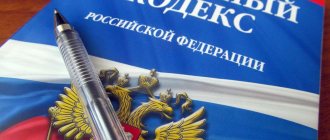Main types of punishments
The main types of punishments can be imposed by the court only as independent ones and cannot be added to other punishments. This or that main type of punishment can be imposed by the court only if it is directly enshrined in the sanction of the applicable article of the Special Part of the Criminal Code of the Russian Federation. An exception to this rule is Art. 64 of the Criminal Code of the Russian Federation, according to which, in the presence of exceptional mitigating circumstances, the court may impose a more lenient punishment than provided for this crime.
The main types of punishments include:
- compulsory work;
- correctional work;
- restriction on military service;
- forced labor;
- arrest;
- detention in a disciplinary military unit;
- imprisonment for a certain period of time;
- life imprisonment;
- the death penalty.
One of the features of the main types of punishment is that other main types of punishment cannot be added to one main type of punishment. So, for example, if a person is sentenced to imprisonment for committing one crime, and correctional labor for committing another, then to assign the final punishment it is necessary to resort to the provisions of Art. 71 of the Criminal Code of the Russian Federation, converting correctional labor into the ratio of imprisonment at the rate of one day of imprisonment to three days of correctional labor. If a person is sentenced to imprisonment for committing one crime, and a fine as the main type of punishment for committing another, then each of the imposed punishments should be carried out independently, since criminal law does not provide for the possibility of transferring a fine to other types of punishment.
The institution of early release from serving a sentence (conditional early release from serving a sentence, release from serving a sentence due to illness, replacing the unserved part of a sentence with a milder type of punishment) applies only to punishments assigned as main ones (but it is possible to release from serving and additional punishment).
Commentary to Art. 45 of the Criminal Code of the Russian Federation
Any system can have subsystems. Also, types of criminal penalties can be divided (classified) into certain groups on certain grounds (criteria).
In criminal legislation (Article 45 of the Criminal Code of the Russian Federation), according to the order of imposition of punishment, punishments are classified into those applied only as basic ones, applied only as additional ones and mixed ones, i.e. used as both basic and additional.
The main punishments include: compulsory labor; correctional work; restriction on military service; restriction of freedom; arrest; detention in a disciplinary military unit; imprisonment for a certain period of time; life imprisonment; the death penalty. The main types of punishments are assigned only independently; they cannot be added to other main punishments. They are always indicated in the sanctions of articles of the Special Part of the Criminal Code of the Russian Federation. But in the presence of exceptional circumstances, the court has the right to assign a different (but only milder) type of main punishment than that provided for in a specific article of the Special Part of the Criminal Code of the Russian Federation (Part 1 of Article 64 of the Criminal Code of the Russian Federation). When assigning a punishment, additional punishments may be added to the main one, including those not specified in the sanction articles. The institution of early release from serving a sentence (conditional early release from serving a sentence, release from serving a sentence due to illness, replacing the unserved part of a sentence with a milder type of punishment) applies only to punishments assigned as main ones (but it is possible to release from serving and additional punishment).
Additional punishments include only one type - deprivation of a special, military or honorary title, class rank and state awards. Additional punishment cannot be applied independently, without combination with the main ones. The peculiarity of this type of punishment is that it can only be applied for serious and especially serious crimes and its purpose depends only on judicial discretion (this type of punishment is not contained in the sanctions of the articles).
To mixed punishments, i.e. Punishments that can be imposed both as primary and as additional include: fine; deprivation of the right to hold certain positions or engage in certain activities. A fine as either a primary or additional punishment can be imposed only in cases specifically provided for by the relevant articles of the Special Part of the Criminal Code of the Russian Federation. Only in the same cases can a large fine (from 0.5 million rubles) be imposed for grave and especially grave crimes. To impose a punishment in the form of deprivation of the right to hold certain positions or engage in certain activities, it matters whether it is applied as a main one (sanction - from one year to five years) or additional (from six months to three years). Punishment in the form of deprivation of the right to hold certain positions or engage in certain activities may be imposed as an additional punishment in cases where it is not provided for in the relevant article of the Special Part of the Criminal Code of the Russian Federation (Part 3 of Article 47 of the Criminal Code of the Russian Federation). In the articles of the Special Part of the Criminal Code of the Russian Federation, the use of mixed punishments in combination with the main ones can be either mandatory (Part 3 of Article 286 of the Criminal Code of the Russian Federation) or optional (Part 2 of Article 286 of the Criminal Code of the Russian Federation). As stated in paragraph 39 of the Resolution of the Plenum of the Supreme Court of the Russian Federation of January 11, 2007 No. 2 “On the practice of imposing criminal punishment by the courts of the Russian Federation,” when imposing punishment under articles of the criminal law that provide for the possibility of applying additional punishment at the discretion of the court, the sentence should indicate the reasons for its use with relevant motives.
If the law under which the crime was committed provides for the mandatory imposition of an additional punishment (for example, Part 1 of Article 290 of the Criminal Code of the Russian Federation), then its non-application by the court is allowed only if the conditions provided for in Art. 64 of the Criminal Code of the Russian Federation (i.e. in the presence of exceptional circumstances), and must be motivated in the sentence with reference to this article.
———————————
Bulletin of the Supreme Court of the Russian Federation. 2007. N 4.
Additional and mixed punishments, applied as additional ones, when added to the main ones, are executed independently (Part 2 of Article 71 of the Criminal Code of the Russian Federation).
The penal legislation has adopted a different classification of punishments - based on the degree of isolation. It identifies punishments related to the isolation of the convicted person from society (arrest, imprisonment, detention in a disciplinary military unit) and those not related to the isolation of the convicted person from society, i.e. all other types of punishment (excluding the death penalty). In turn (but this is no longer a legislative, but a theoretical classification), punishments not related to the isolation of the convicted person from society are divided into punishments related to the compulsory work activity of the convicted person (compulsory work; correctional labor; restriction of freedom) and those not related to compulsory labor. labor activity of the convicted person (fine; deprivation of the right to hold certain positions and engage in certain activities; deprivation of a special, military or honorary title, class rank or state awards).
In theory, there are other classifications of punishments. Punishments are divided into general (universal) and special (special). This classification has important practical significance, since it is associated with the differentiation of sentencing. The division of punishments into general and special traditionally comes from the Code of Criminal and Correctional Punishments (1845). The penalties provided for in Art. 44 of the Criminal Code of the Russian Federation, can also be classified into general and special. General punishments apply to all persons who have committed crimes - a fine, imprisonment for a certain period. True, after the changes made to the Criminal Code of the Russian Federation by Federal Law of December 8, 2003 N 162-FZ, imprisonment for a certain period of time ceased to be a universal punishment: now it cannot be assigned to minors who have committed crimes of minor gravity for the first time, as well as to persons under 16 years old who committed crimes of moderate gravity for the first time (Part 6 of Article 88 of the Criminal Code of the Russian Federation). Special punishments apply only to certain categories of citizens who have committed crimes: restrictions on military service and detention in a disciplinary military unit - for military personnel; deprivation of the right to hold certain positions - to officials; deprivation of a special, military or honorary title, class rank and state awards - to persons who have the corresponding titles or state awards; correctional labor - for persons who do not have a main place of work. In addition, there are punishments for which there are restrictions in their assignment related to the personality characteristics of the perpetrator. For example, the death penalty and life imprisonment are not imposed on minors, women, and men who have reached the age of 65 (part 2 of article 57, part 2 of article 59 of the Criminal Code of the Russian Federation). Restrictions on assignment also exist for compulsory work (Part 4 of Article 49 of the Criminal Code of the Russian Federation); correctional labor (Part 5 of Article 50 of the Criminal Code of the Russian Federation); restrictions on freedom (Part 5 of Article 53 of the Criminal Code of the Russian Federation); arrest (Part 2 of Article 54 of the Criminal Code of the Russian Federation).
Punishments can also be classified depending on how fully the content of the punishment is recorded in the articles of the General Part of the Criminal Code of the Russian Federation (i.e. in the norms of substantive law). Here we can highlight urgent sentences (restriction of freedom, arrest, imprisonment) served in specialized institutions that are part of the penal system, subordinate to the Ministry of Justice of Russia. For these punishments, the articles of the General Part of the Criminal Code of the Russian Federation indicate only a general framework: restriction of freedom consists of keeping the convicted person in a special institution without isolation from society (Article 53 of the Criminal Code of the Russian Federation); arrest consists of keeping the convicted person in conditions of strict isolation from society (Article 54 of the Criminal Code of the Russian Federation); deprivation of liberty consists of isolating the convicted person from society by sending him to a correctional institution (Article 56 of the Criminal Code of the Russian Federation). The establishment of a specific set of legal restrictions for these punishments is delegated to the Penal Code of the Russian Federation. The content of the punishment in the form of detention in a disciplinary military unit is disclosed only in the Penal Code of the Russian Federation (Chapter 20 of the Penal Code of the Russian Federation).
And there are punishments, the content of which is determined in the norms of the General Part of the Criminal Code of the Russian Federation: fine; compulsory work; correctional work; restriction on military service; deprivation of the right to hold certain positions or engage in certain activities; deprivation of a special, military or honorary title, class rank and state awards.
Additional types of punishment
Punishments applied only as additional ones include only one type - deprivation of a special, military or honorary title, class rank and state awards. Additional punishment cannot be applied independently, without combination with the main ones. There is no indication of this type of punishment in any of the sanctions in the article of the Special Part of the Criminal Code of the Russian Federation. Therefore, the court can deprive a person of a special, military or honorary title, class rank and state awards if there is such a need for any serious or especially serious crime (Article 48 of the Criminal Code of the Russian Federation).
Judicial practice under Article 45 of the Criminal Code of the Russian Federation
Appeal ruling of the Judicial Collegium for Criminal Cases of the Supreme Court of the Russian Federation dated March 13, 2019 N 58-APU19-2
According to Part 3 of Art. The Criminal Code of the Russian Federation applies deprivation of military rank and state awards only as an additional type of punishment. By virtue of Art. According to the Criminal Code of the Russian Federation, a court, taking into account the identity of the perpetrator, can deprive him of his military rank and state awards for committing a grave or especially grave crime.
Resolution of the Presidium of the Supreme Court of the Russian Federation dated September 19, 2018 N 151P18
In accordance with Part 2 of Art. , art. of the Criminal Code of the Russian Federation in relation to Bukreev M.A. the following restrictions have been established: do not travel outside the territory of the relevant municipality, do not change your permanent place of residence and work without notifying a specialized government agency, do not leave your home during the period from 19 pm to 7 am, do not visit crowded places - parks, cafes, restaurants, discos, nightclubs, are obliged to appear at the specialized state body that supervises the serving of a sentence of restriction of freedom by a convicted person four times a month for registration.
Resolution of the Presidium of the Supreme Court of the Russian Federation dated September 13, 2017 N 144P17
According to Part 1 of Art. 308 of the Code of Criminal Procedure of the Russian Federation, the operative part of the guilty verdict must, in particular, indicate the type and amount of punishment imposed on the defendant for each crime of which he was found guilty; decision on additional types of punishment in accordance with Art. Criminal Code of the Russian Federation; restrictions that are established for a person sentenced to punishment in the form of restriction of freedom.
Resolution of the Presidium of the Supreme Court of the Russian Federation dated January 29, 2020 N 193P19
According to Part 1 of Art. 308 of the Code of Criminal Procedure of the Russian Federation, the operative part of the guilty verdict must, in particular, indicate the type and amount of punishment imposed on the defendant for each crime of which he was found guilty; decision on additional penalties in accordance with Art. Criminal Code of the Russian Federation; restrictions that are established for a person sentenced to punishment in the form of restriction of freedom.
“Review of judicial practice of the Supreme Court of the Russian Federation No. 2 (2020)”
According to Part 1 of Art. 308 of the Code of Criminal Procedure of the Russian Federation, the operative part of the guilty verdict must, in particular, indicate the type and amount of punishment imposed on the defendant for each crime of which he was found guilty; decision on additional penalties in accordance with Art. Criminal Code of the Russian Federation; restrictions that are established for a person sentenced to punishment in the form of restriction of freedom.
Punishments applied both as primary and additional
Punishments that can act as both primary and additional punishment include:
- fine;
- deprivation of the right to hold certain positions or engage in certain activities;
- restriction of freedom.
A fine and restriction of freedom as additional types of punishment can be imposed by the court only if they are provided for by the sanction of the applicable article of the Special Part of the Criminal Code of the Russian Federation. Deprivation of the right to hold certain positions or engage in certain activities as an additional punishment may be imposed even when it is not provided for by the sanction of the relevant article of the Special Part of the Criminal Code, if the court considers it inappropriate to preserve the convicted person’s right to occupy a certain position or engage in certain activities.







